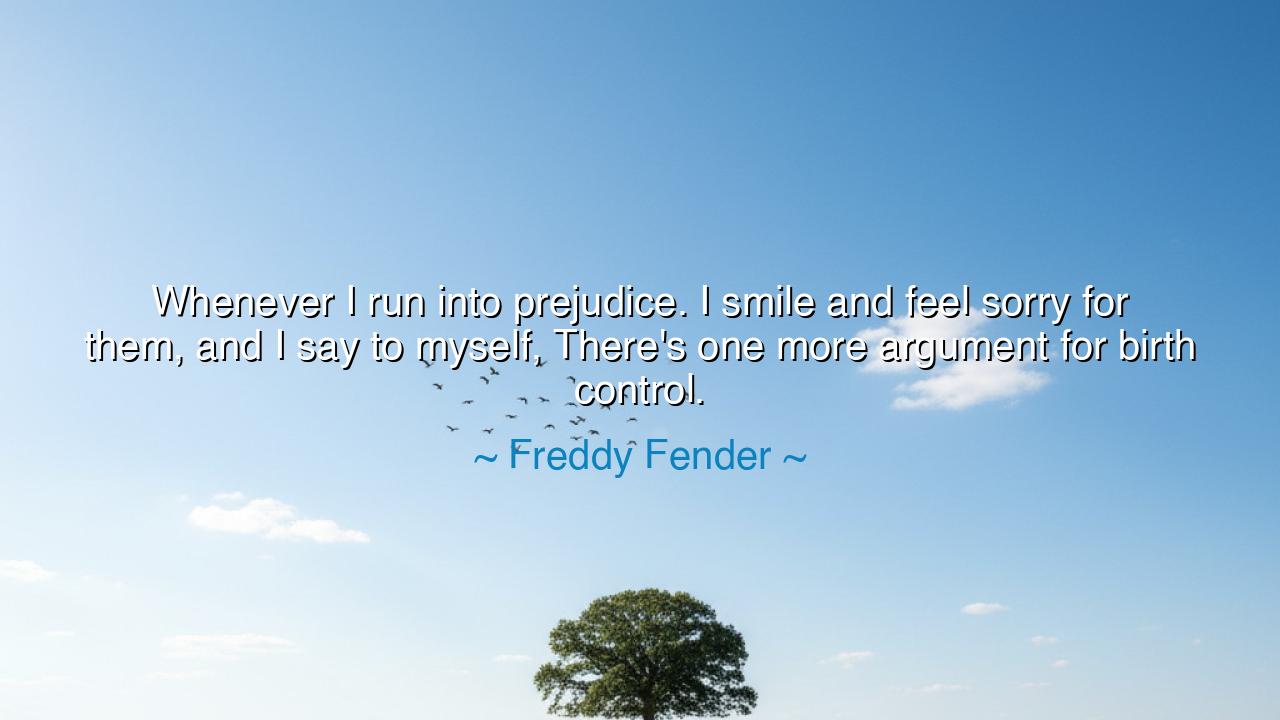
Whenever I run into prejudice. I smile and feel sorry for them
Whenever I run into prejudice. I smile and feel sorry for them, and I say to myself, There's one more argument for birth control.






The words of Freddy Fender come to us sharpened with wit, yet softened with wisdom: “Whenever I run into prejudice, I smile and feel sorry for them, and I say to myself, ‘There’s one more argument for birth control.’” At first hearing, it seems a jest, a playful strike against ignorance. But beneath the humor lies a profound teaching—how to face hatred not with bitterness, but with strength, with irony, and with the refusal to let prejudice conquer the heart.
To smile in the face of scorn is no small thing. It is not the smile of agreement, nor the weak smile of surrender. It is the smile of defiance, the smile that says, “Your hatred cannot touch the core of who I am.” Fender, a man who carried both the burdens of cultural identity and the hardships of life, understood that to carry anger at every insult is to chain oneself to the oppressor. By smiling, he frees himself. By feeling sorry for the one who hates, he lifts himself above them. And by turning their prejudice into a joke about birth control, he robs their cruelty of its sting, transforming it into fuel for laughter.
The ancients knew this wisdom as well. Consider the philosopher Socrates, who was mocked, ridiculed, and ultimately condemned by his city. Yet when faced with insult, he often responded with humor, turning his critics’ words into riddles that revealed their foolishness. Like Fender, Socrates understood that to answer cruelty with anger only feeds the fire, but to answer with wit and calm is to extinguish it, leaving the offender exposed in their own emptiness. Prejudice, whether in Athens or in modern times, is weakened not by shouting, but by refusing to grant it power over the soul.
Fender’s words also hold a mirror to the foolishness of hate. To say that prejudice itself is an argument for birth control is to remind us that such ignorance is not a noble inheritance, but a disease passed from one heart to another. It suggests that hatred is not worthy to reproduce, that the world would be better spared its perpetuation. Though said in jest, the image carries a sharp truth: when prejudice multiplies, it poisons generations; when it is checked, compassion and understanding have room to flourish.
History offers many examples of this same spirit. Think of Jackie Robinson, the first Black man to break Major League Baseball’s color barrier. He endured jeers, insults, and threats with composure, answering cruelty not with rage but with dignity and sometimes even smiles. By rising above the hate of his day, he did not just play the game—he transformed it, proving that prejudice could not stand against character. His life, like Fender’s words, shows that those who choose grace over fury leave behind a legacy greater than victory alone.
The lesson for us is this: when we encounter prejudice, we must not allow it to chain our spirits. To fight it, yes—but not to let it twist our hearts into bitterness. We must learn to smile, not as those who are weak, but as those who know the truth: that hate is pitiful, that ignorance is beneath us, and that dignity cannot be stolen by insult. Humor, too, is a weapon of the strong, for it unmasks the absurdity of hatred and strips it of its false grandeur.
Therefore, let us practice this ancient strength. When you meet hostility, guard your heart. Do not surrender it to anger, but hold it steady with calm. If you can, meet the cruelty with wit, for laughter can break chains that fury cannot. And most of all, let your actions, your life, your very presence, stand as proof that prejudice has no power to define who you are.
Thus, Freddy Fender’s words, though cloaked in humor, become a lasting teaching: that the soul which chooses compassion and courage over hatred is unconquerable. The smile of the strong is sharper than the sword of the cruel, and the laughter of the wise will echo long after the voices of the ignorant are silent.






AAdministratorAdministrator
Welcome, honored guests. Please leave a comment, we will respond soon